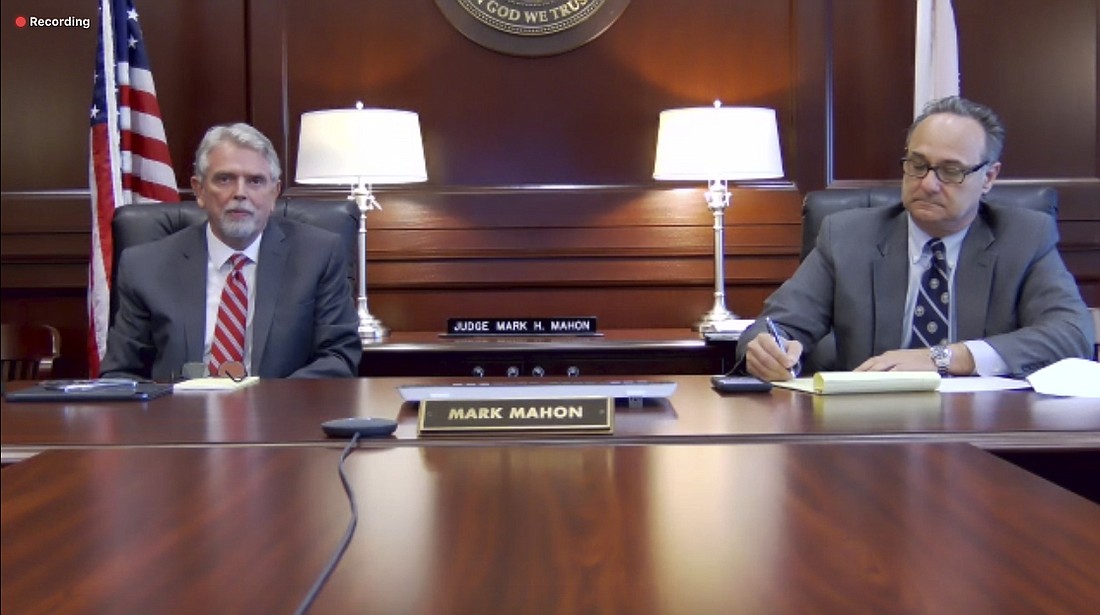
Judges in the 4th Judicial Circuit adapted to the challenges created the past year by the coronavirus pandemic and they look forward to the court returning soon to conducting business as usual.
That return is scheduled to begin, slowly and with personal safety precautions in place, in April, said Chief Judge Mark Mahon.
The chief judge led a remote panel discussion March 16 with the circuit’s administrative judges, presented for CLE credit by the Jacksonville Bar Association.
Mahon said Duval County’s coronavirus positive test statistics continue to improve and the court is moving to begin conducting in-person trials with juries seated within weeks.
There will be some changes.
Instead of summoning about 600 potential jurors to the Duval County Courthouse in one group each Monday morning, jurors will be summoned in groups of about 50 five days a week in morning and afternoon sessions. Their service will be designated for circuit criminal cases, county court and civil trials.
“We’ll also try to seat a jury for a first-degree murder trial. It’s ambitious,” Mahon said.
“The judiciary is looking forward to the day when everyone can return to the courthouse,” said Circuit Judge Adrian Soud.
He said many proceedings in criminal court other than jury trials are conducted virtually and the court expects to be able to expand the number of in-person hearings, providing that the defendant, prosecutor and defense attorneys agree to appear in the courthouse.
“The felony judges have made a Herculean effort,” Mahon said.
Circuit Judge Waddell Wallace said he’s been successfully using Zoom for routine hearings. The feedback from participants, who don’t have to be at the courthouse for a short hearing, has been positive.
“I’m of the mind we ought to use it when available. It’s a tremendous advantage,” Wallace said.
Probate cases probably have been the least affected after the courthouse closed 12 months ago, said Circuit Judge Jack Schemer.
He said probate cases don’t rely as much on litigation as other cases, but the judicial assistants are more involved in the process. They are scanning documents that are emailed after remote hearings and then filing them with the clerk’s office instead of the attorneys filing their documents at the courthouse.
“Everything is working,” Schemer said.
Duval County Judge Gary Flower said Zoom is acceptable for preliminary hearings, traffic court and some criminal cases and the first county court jury trials were scheduled March 17 and March 18.
“The court system was hit with something way beyond society’s compass. Within a year, we retooled to provide as much due process as we humanly can,” Flower said.
Circuit Judge Don Lester is assigned to Clay County. He is a member of a work group formed to make procedural recommendations to the state Supreme Court as the justice system plans its future in response to safety restrictions required by the coronavirus.
“We’re reviewing the rules to account for virtual proceedings – to bring the rules into the 21st century,” he said.
Traffic court in Clay County is proceeding smoothly on Zoom.
“That will likely continue even after we go back to normal operations,” Lester said.
However, technology can’t fully replace tradition, Lester said.
“Despite the efficiency of Zoom, some things are done better in person. We’re social animals.”
Mahon said with the state Legislature in session, there is “a lot of anxiety about funding” for the courts.
“We’re optimistic that the House and Senate recognize the need for a fully functioning court system,” Mahon said.
That will be even more important as the justice system begins its return to its pre-pandemic operational level.
Mahon said an estimated 1.2 million cases are waiting to be processed, a combination of those that were in the pipeline when the courts shut down in March 2020 and those that have been filed since.
There also will be an additional workload resulting from the pandemic, such as evictions and foreclosures that will be filed when the federal coronavirus emergency moratorium on such cases expires.
“The process has got to come back to its natural place or we’ll be forever behind,” Flower said.
Mahon said he hears from judges every day about how stressful it must be for attorneys to continue to make a living and produce good outcomes for their clients as everyone adapts to the new ways of conducting cases.
“We like to hear from practitioners. All of this is a work in progress,” Mahon said.
JBA members may visit jaxbar.org to view the association’s schedule of CLE programs and other events.